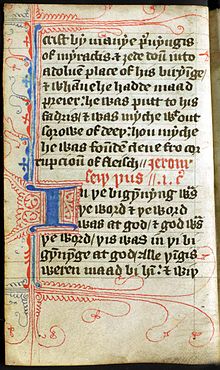
Back Wyclif-Bibel German Βίβλος του Γουίκλιφ Greek Biblia de Wycliffe Spanish Bible de Wyclif French Alkitab Wycliffe ID 위클리프 성경 Korean Wycliffebijbel Dutch Bíblia de Wycliffe Portuguese Библия Уиклифа Russian Wycliffe's Bible SIMPLE
| Wycliffe's Bible | |
|---|---|
 | |
| Complete Bible published | 1382 |
| Online as | Wycliffe's Bible at Wikisource |
| Derived from | Latin Vulgate |
| Translation type | Formal equivalence |
| Revision | 1388,[a] 1395 |
In þe bigynnyng God made of nouȝt heuene and erþe. Forsoþe þe erþe was idel and voide, and derknessis weren on the face of depþe; and the Spiryt of þe Lord was borun on the watris. And God seide, Liȝt be maad, and liȝt was maad.
For God louede so þe world, that he ȝaf his oon bigetun sone, þat ech man þat bileueþ in him perische not, but haue euerlastynge lijf. | |
Wycliffe's Bible (also known as the Middle English Bible [MEB], Wycliffite Bibles, or Wycliffian Bibles) is a sequence of orthodox Middle English Bible translations from the Latin Vulgate which appeared over a period from approximately 1382 to 1395.[1]
Two different but evolving translation branches have been identified: mostly word-for-word translations classified as Early Version (EV) and the more sense-by-sense recensions classified as Later Version (LV). They are the earliest known literal translations of the entire Bible into English (Middle English);[2] however, several other translations, probably earlier, of most New Testament books and Psalms into Middle English are extant.
The authorship, orthodoxy, usage, and ownership has been controversial in the past century, with historians now downplaying the certainty of past beliefs that the translations were made by controversial English theologian John Wycliffe of the University of Oxford directly or with a team including John Purvey and Nicholas Hereford to promote Wycliffite ideas, used by Lollards for clandestine public reading at their meetings, or contained heterodox translations antagonistic to Catholicism.[3]: 316
The term "Lollard Bible" is sometimes used for a version of Wycliffite Bible with inflamatory Wycliffite texts added. At the Oxford Convocation of 1408, it was solemnly voted that in England no new translation of the Bible should be made without prior approval.
Cite error: There are <ref group=lower-alpha> tags or {{efn}} templates on this page, but the references will not show without a {{reflist|group=lower-alpha}} template or {{notelist}} template (see the help page).
- ^ "Versions of the Bible", Catholic Encyclopedia, New advent.
- ^ Daniell 2003, p. 66.
- ^ Kelly, Henry Ansgar (2023). "The Bible in England in the long fifteenth century: from boom to bust to piecemeal interest". Medium Aevum. 92 (2): 316-341.